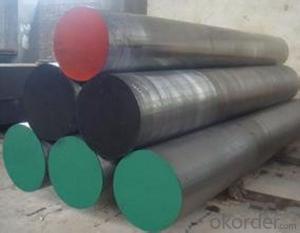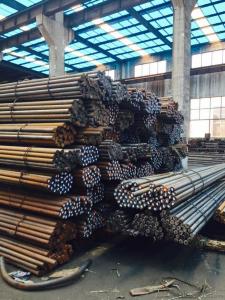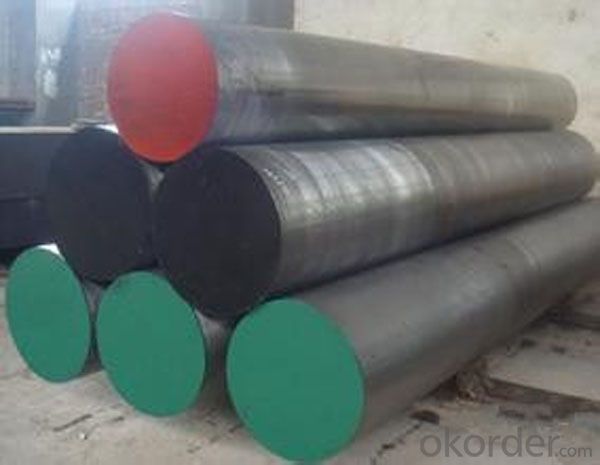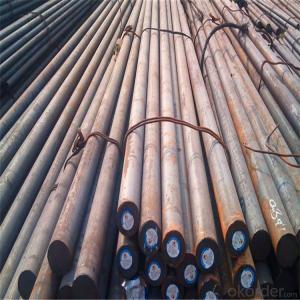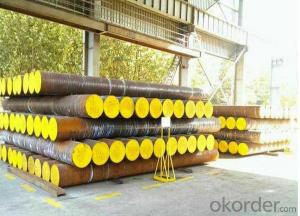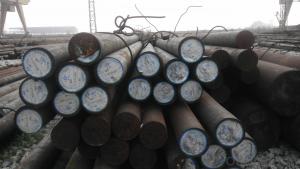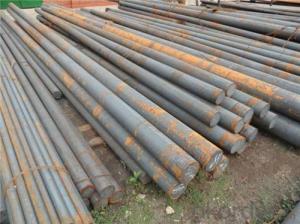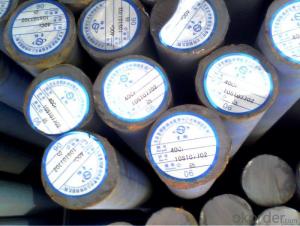Special Steel Gear Steel SCM420H Round Bar
- Loading Port:
- China main port
- Payment Terms:
- TT OR LC
- Min Order Qty:
- 30 m.t.
- Supply Capability:
- 10000 m.t./month
OKorder Service Pledge
OKorder Financial Service
You Might Also Like
Specification
Product information:
1. Grade Comparison
GB | DIN | JIS | NF | BS | AISI |
20CrMoH | 25CrMo4 | SCM420 | 25CrMo4 | 25CrMo4 | 4118 |
2. Specification
Commodity | SCM420H Round bar | |
diameter | 10-300mm | |
Length | 3000-15000mm | |
Productive Technology | Hot-Rolled | |
Tolerance | +/-0.15mm | |
Application | Gear. Axis. Ring. Gears shafts. Sliding bearing spindle beams and Clutch etc | |
C | 0.17-0.23 | |
Chemical Composition of Material | Si | 0.15-0.35 |
Mn | 0.55-0.90 | |
P | 0.030 | |
S | 0.030 | |
Cr | 0.85-1.25 | |
Ni | 0.030 | |
Cu | 0.030 | |
Mechanical Property | Tensile Strength | 1080 |
Yield Strength | 835 | |
Extension | ≥10 | |
Hardness | 217HB | |
Product Show:
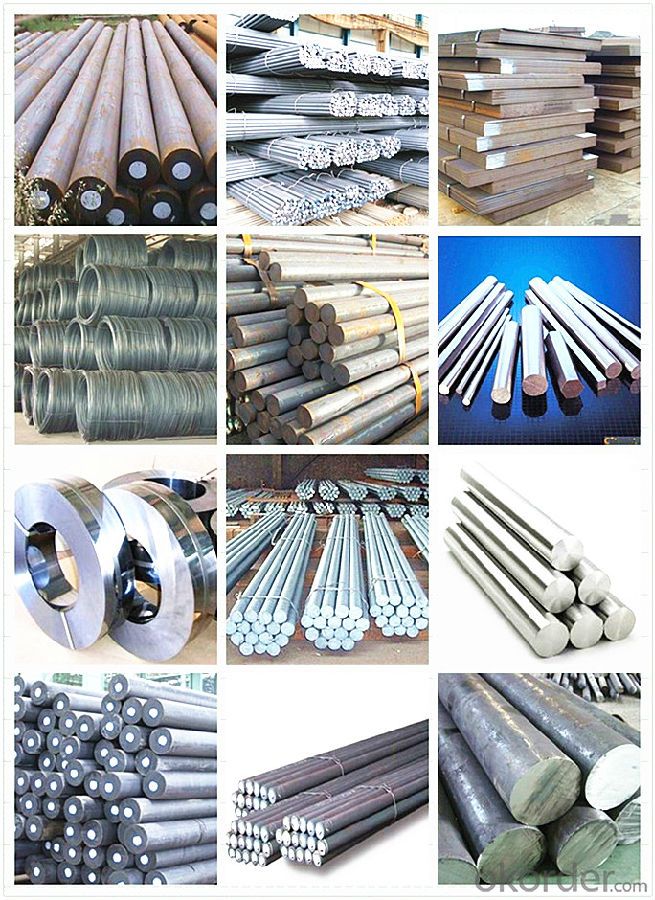
Workshop Show:
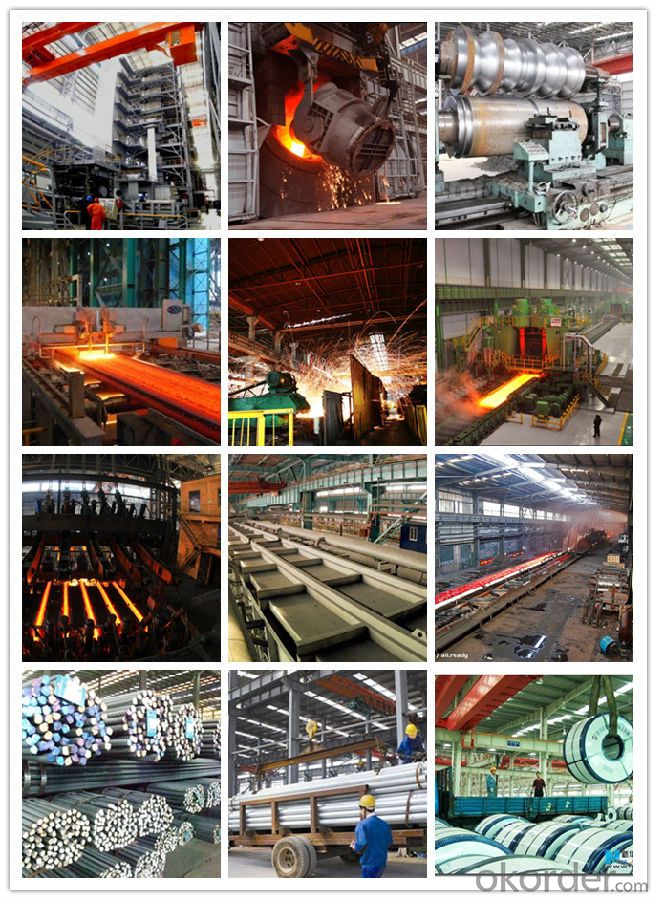
Shipping
1. FedEx/DHL/UPS/TNT for samples, Door-to-Door;
2. By Air or by Sea for batch goods, for FCL; Airport/ Port receiving;
3. Customers specifying freight forwarders or negotiable shipping methods!
Delivery Time: 3-7 days for samples; 5-25 days for batch goods.
Payment Terms
1.Payment: T/T, L/C, Western Union, MoneyGram,PayPal; 30% deposits; 70% balance before delivery.
2.MOQ: 1pcs
3.Warranty : 3 years
4.Package Informations: 1) EXPORT, In 20 feet (GW 25 ton) or 40 feet Container (GW 25 ton)
2)as customer's requirement
Why choose us?
(1) The leading exporter in China special steel industry.
(2) Large stocks for various sizes, fast delivery date.
(3) Good business relationship with China famous factories.
(4) More than 7 years steel exporting experience.
(5) Good after-sales service guarantee.
- Q: What are the main applications of special steel in the defense electronics?
- Special steel is used in defense electronics for a variety of applications. It is primarily utilized in the manufacturing of critical components such as casings, connectors, and circuit boards due to its exceptional strength, durability, and resistance to corrosion. Special steel's high magnetic permeability also makes it suitable for electromagnetic shielding, which is crucial in protecting electronic devices from external interference. Moreover, its heat resistance and ability to withstand extreme temperatures enable it to be used in electronic systems that operate in harsh environments. Overall, special steel plays a vital role in enhancing the reliability and performance of defense electronics.
- Q: How does special steel contribute to the construction machinery industry?
- High-strength and durable components are essential in the construction machinery industry, and special steel plays a crucial role in providing these. It is able to withstand extreme stress and load-bearing requirements, which is particularly important considering the heavy-duty applications of construction machinery. Special steel's excellent mechanical properties allow it to resist severe conditions, such as heavy loads, vibrations, and impacts, ensuring the safety and reliability of the equipment. Special steel is also widely used in critical components of construction machinery, including booms, buckets, tracks, and gears. These components face intense wear and tear due to constant use in harsh environments. However, special steel, engineered with enhanced hardness and wear resistance, helps prolong the lifespan of these components, reducing maintenance costs and downtime. In addition to its durability, special steel provides superior corrosion resistance, a crucial feature for construction machinery used in humid or corrosive environments. By preventing rust and decay, special steel helps maintain the equipment's performance and longevity, ultimately increasing productivity and efficiency in construction projects. Furthermore, special steel allows the construction machinery industry to achieve innovative designs and advanced functionalities. Its versatility allows for the creation of complex shapes and precise tolerances, which are necessary for optimizing machinery performance and efficiency. Special steel also enables the incorporation of advanced technologies, like sensors and automation, enhancing the accuracy and productivity of construction equipment. To summarize, special steel significantly contributes to the construction machinery industry by withstanding extreme conditions, providing superior wear resistance and corrosion protection, and enabling innovative designs. By utilizing special steel in the manufacturing process, construction machinery manufacturers can ensure the durability, safety, and efficiency of their equipment, ultimately benefiting the construction industry as a whole.
- Q: What are the future prospects for the special steel industry?
- The future prospects for the special steel industry are promising. With the increasing demand for high-performance and durable materials in various sectors such as automotive, aerospace, construction, and energy, the special steel industry is expected to witness steady growth. Additionally, advancements in technology and innovation are likely to drive the development of new and improved special steel alloys, further boosting the industry's prospects. Furthermore, the growing emphasis on sustainability and environmental regulations may create opportunities for the special steel industry to develop eco-friendly solutions. Overall, the special steel industry is well-positioned for a prosperous future.
- Q: How are tungsten alloys used in the defense industry?
- Tungsten alloys are extensively used in the defense industry due to their exceptional strength, high density, and excellent resistance to heat and wear. These alloys are commonly utilized in the manufacturing of armor-piercing ammunition, artillery projectiles, and kinetic energy penetrators. Tungsten alloys are also employed in the production of various defense equipment such as missile components, bomb casings, and tank armor. Their ability to withstand extreme conditions and deliver superior performance makes them invaluable in enhancing the effectiveness and protection capabilities of military applications.
- Q: What is the impact of impurities on the machinability of special steel?
- Impurities can have a significant impact on the machinability of special steel. These impurities can cause variations in the material's hardness, toughness, and other mechanical properties, making it more difficult to machine. They can also lead to increased tool wear and reduced cutting speeds, resulting in lower productivity and increased production costs. Therefore, it is crucial to minimize impurities during the manufacturing process to ensure optimal machinability of special steel.
- Q: What are the requirements for special steel used in food processing equipment?
- The requirements for special steel used in food processing equipment are crucial for ensuring the safety and hygiene of the food being processed. Here are some key requirements: 1. Corrosion resistance: Special steel used in food processing equipment must have excellent resistance to corrosion. It should be able to withstand exposure to various food products, cleaning agents, and environmental conditions without deteriorating or contaminating the food. 2. Hygienic properties: The steel must have a smooth surface finish and be free from any cracks, pits, or crevices where bacteria or food particles can accumulate. This helps in easy cleaning and prevents the growth of harmful microorganisms, ensuring the food's safety. 3. Non-reactivity: Food processing equipment's steel should not react with the food or alter its taste, color, or odor. It must be chemically inert and should not release any substances that could contaminate or affect the food's quality. 4. High temperature resistance: Food processing often involves high-temperature operations like cooking, sterilization, or pasteurization. Special steel used in such equipment must be able to withstand these temperature extremes without losing its structural integrity or releasing any harmful substances. 5. Mechanical strength: The steel should possess sufficient mechanical strength to withstand the processing equipment's operational stresses, such as pressure, vibration, or impact. This ensures its durability and prevents any failures or breakages during operation. 6. Compliance with regulations: Special steel used in food processing equipment must meet specific regulatory standards and certifications related to food safety and hygiene, such as the FDA (Food and Drug Administration) or NSF (National Sanitation Foundation) guidelines. Compliance with these regulations ensures that the equipment is safe for use in the food industry. Overall, the requirements for special steel used in food processing equipment revolve around ensuring the equipment's durability, cleanliness, and safety while maintaining the quality and integrity of the processed food.
- Q: How does special steel contribute to the magnetic properties of products?
- Special steel can contribute to the magnetic properties of products by having specific alloying elements and heat treatments that enhance its ferromagnetic properties, resulting in higher magnetic permeability and increased magnetization.
- Q: What is the role of heat treatment in special steel?
- The role of heat treatment in special steel is to enhance its mechanical properties and improve its performance by altering its microstructure through controlled heating and cooling processes. This helps to achieve desired properties such as increased hardness, strength, toughness, and ductility, as well as improved wear resistance and corrosion resistance. Heat treatment also allows for the refinement of grain structure, elimination of internal stresses, and modification of the steel's crystalline structure, which ultimately improves the overall quality and usability of special steel in various applications.
- Q: What are the requirements for special steel used in mining equipment?
- Special steel used in mining equipment needs to possess certain key requirements. Firstly, it must have high strength and toughness to withstand the harsh and demanding conditions present in mining operations. It should also exhibit excellent wear resistance to endure the abrasive nature of rocks and minerals. Additionally, corrosion resistance is crucial to prevent the steel from deteriorating due to exposure to water, chemicals, and other corrosive substances commonly found in mining environments. Finally, the special steel used in mining equipment should be capable of maintaining its mechanical properties at elevated temperatures, as mining processes often involve high heat generation. Overall, the requirements for special steel in mining equipment revolve around durability, wear resistance, corrosion resistance, and heat resistance.
- Q: How is die steel used in metal stamping processes?
- Die steel is used in metal stamping processes as it is a strong and durable material that can withstand the high pressures and forces involved in shaping and forming metal. It is used to create dies, which are specialized tools that are used to shape and cut metal into specific designs or forms. The die steel acts as a mold or template, allowing the metal to be stamped, bent, or cut into the desired shape with precision and accuracy.
Send your message to us
Special Steel Gear Steel SCM420H Round Bar
- Loading Port:
- China main port
- Payment Terms:
- TT OR LC
- Min Order Qty:
- 30 m.t.
- Supply Capability:
- 10000 m.t./month
OKorder Service Pledge
OKorder Financial Service
Similar products
Hot products
Hot Searches
Related keywords
